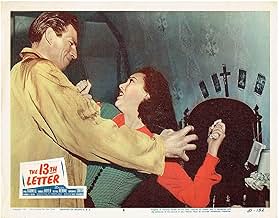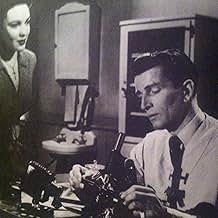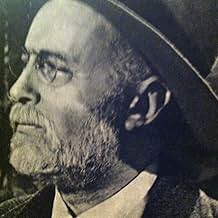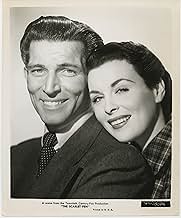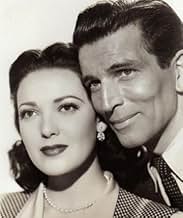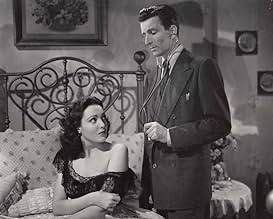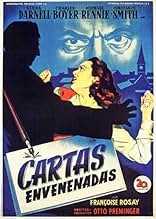Des citoyens respectables reçoivent des lettres anonymes révélant leurs relations adultères.Des citoyens respectables reçoivent des lettres anonymes révélant leurs relations adultères.Des citoyens respectables reçoivent des lettres anonymes révélant leurs relations adultères.
- Réalisation
- Scénario
- Casting principal
George Alexander
- Dr. Fletcher
- (non crédité)
Jacques Auger
- Priest
- (non crédité)
Lucie Boitres
- Townswoman
- (non crédité)
C. Bosvier
- Townsman
- (non crédité)
Sheila M. Coonan
- Townswoman
- (non crédité)
Wilford Davidson
- Townsman
- (non crédité)
Camille Ducharme
- Fredette
- (non crédité)
J. Léo Gagnon
- Dr. Helier
- (non crédité)
Blanche Gauthier
- Townswoman
- (non crédité)
Arthur Groulx
- Townsman
- (non crédité)
Avis à la une
I used to think of the Hollywood proclivity toward remaking foreign films in English to be a modern phenomenon until I encountered the 1951 remake of Fritz Lang's German classic "M" from 1939. Well, that comment segues nicely into the American remake of "Le Corbeau." "The 13th Letter" doesn't mention the French film as a source nor the historical incident from the 1920s it is based on but refers back only to the novel. It does pay some homage to its French origins. An opening title tells us that the new movie was filmed in its entirety at a "small French-Canadian community in the Province of Quebec." When I reviewed the Hollywood remake of Fritz Lang's "M" (released the same year as "The 13th Letter" but from different studios), I said that if you could, as much as possible, take the new film on its own merits then it had quite a bit to offer. I can't quite say the same for the Preminger effort. The director doesn't seem to be working too hard for a film that falls between "Where The Sidewalk Ends" and "Angel Face" in his filmography. The new film is not quite a shot-for-shot remake but is pretty much a scene-for-scene redo. The only substantial change is right at the end where a fairly long dialog passage goes to explaining the crimes in a lot more detail than Clouzot provided - but I liked the Clouzot approach better. The new young doctor is played by Michael Rennie who can't come close to showing the inner turmoil that Pierre Fresnay brought to his tormented physician. Linda Darnell is good enough as the landlord's flirty daughter if she isn't nearly as seductive and overtly sexual as the French would have it. The only real notable performance is by Charles Boyer who is quite brilliant as the elderly doctor with the young wife who the anonymous letters continually link to Rennie's character. Howard Koch wrote the screenplay. The cinematographer was Joseph LaShelle (Laura, The Apartment, Marty), so there was talent behind the camera. I can neither recommend or not recommend this picture. See it if curiosity leads you that way. It's not really a bad movie but not a very good one either.
Nestled in the noir cycle is a trio of movies set in the Canadian province of Québec. Ozep's Whispering City and Hitchcock's I Confess make up the first two, followed by Otto Preminger's The 13th Letter. His strategy in setting it there was probably to preserve the Gallic ambience of the original, Clouzot's Le Corbeau (though that version is accounted more mordant and misanthropic).
Michael Rennie left a prosperous medical practice in London to set up residence in Canada after his unfaithful wife left him and later killed herself. He catches many an eye, as there are few marriageable men in the rural village, though Rennie keeps to himself and dotes on his collection of antique timepieces. But suddenly poison pen letters begin to circulate. At first they hint that Rennie is involved with the wife (Constance Smith) of a prominent doctor at the same hospital (Charles Boyer). Soon the letters take a more malicious turn, causing a young war hero to slit his throat by lying about Rennie's withholding a diagnosis of hopeless cancer. The police investigate, and the campaign of libel becomes a political cause celebre.
Rennie, meanwhile, slowly succumbs to the charms of Linda Darnell, who feigns ailments to coax him up to her rooms; beautiful but lonely, she's acutely sensitive when Rennie discovers the club foot she takes pains to conceal. She, too, falls under suspicion, along with many others as the letters continue to come....
Preminger handles the story with slow, modulated suspense, never resorting to shock tactics; his cast uniformly delivers restrained, effective performances (Rennie has never been so good). Distant thunder crackles constantly under the lowering skies, well shot by Joseph LaShelle, adding to the claustrophobic feel of provincial insularity. Yet this superior suspense film languishes in obscurity despite being one of the often dismissed Preminger's better works in the cycle, along with Fallen Angel, Where The Sidewalk Ends, Angel Face and of course Laura.
Michael Rennie left a prosperous medical practice in London to set up residence in Canada after his unfaithful wife left him and later killed herself. He catches many an eye, as there are few marriageable men in the rural village, though Rennie keeps to himself and dotes on his collection of antique timepieces. But suddenly poison pen letters begin to circulate. At first they hint that Rennie is involved with the wife (Constance Smith) of a prominent doctor at the same hospital (Charles Boyer). Soon the letters take a more malicious turn, causing a young war hero to slit his throat by lying about Rennie's withholding a diagnosis of hopeless cancer. The police investigate, and the campaign of libel becomes a political cause celebre.
Rennie, meanwhile, slowly succumbs to the charms of Linda Darnell, who feigns ailments to coax him up to her rooms; beautiful but lonely, she's acutely sensitive when Rennie discovers the club foot she takes pains to conceal. She, too, falls under suspicion, along with many others as the letters continue to come....
Preminger handles the story with slow, modulated suspense, never resorting to shock tactics; his cast uniformly delivers restrained, effective performances (Rennie has never been so good). Distant thunder crackles constantly under the lowering skies, well shot by Joseph LaShelle, adding to the claustrophobic feel of provincial insularity. Yet this superior suspense film languishes in obscurity despite being one of the often dismissed Preminger's better works in the cycle, along with Fallen Angel, Where The Sidewalk Ends, Angel Face and of course Laura.
I thought "The 13th Letter" was a pleasant surprise, a good mystery that keeps you guessing until the end of the picture. In hindsight, it seems a good idea to place the film in Quebec - it seemed a little quirky when the film began but you gradually get used to it. Acting was good all around, especially the two old pros, Michael Rennie and Charles Boyer. Director Preminger uses all cast members as suspects and sprinkles suspicion around liberally - so much so that you can't pinpoint the culprit until late in the movie.
As noted in the site's summary, someone is writing poison pen letters to the new doctor in town (Rennie), and copying in various and sundry townspeople. The letters accuse the doctor of an affair with the wife of the head of the local hospital (Boyer). This is a well done mystery which I can't recall as being on TV. I think it would be well-received if it were dusted off by FMC - it was produced by 20th Century Fox and must be in their vaults somewhere.
As noted in the site's summary, someone is writing poison pen letters to the new doctor in town (Rennie), and copying in various and sundry townspeople. The letters accuse the doctor of an affair with the wife of the head of the local hospital (Boyer). This is a well done mystery which I can't recall as being on TV. I think it would be well-received if it were dusted off by FMC - it was produced by 20th Century Fox and must be in their vaults somewhere.
Michael Rennie plays a doctor at a Canadian hospital who receives a series of poison pen letters. Soon these letters are sent to others which leads to tension amongst the inhabitants of the small Canadian town.
THE 13TH LETTER is a decent well made mystery which keeps the viewer guessing to the very end who is sending the poison pen letters and why. The cast is quite good, with Rennie giving a stand out performance as noble doctor who is the main target of the nasty letters. It a shame that this film from Otto Preminger is so rarely shown.
THE 13TH LETTER is a decent well made mystery which keeps the viewer guessing to the very end who is sending the poison pen letters and why. The cast is quite good, with Rennie giving a stand out performance as noble doctor who is the main target of the nasty letters. It a shame that this film from Otto Preminger is so rarely shown.
1st watched 5/30/2000 - (Dir-Otto Preminger): Well-done whodunit which revolves around a series of letters written supposedly to defame a local doctor in a Canadian town, but ends up becoming more fatal.It keeps you guessing until the end which is pretty much the measuring stick for this kind of movie.
Le saviez-vous
- AnecdotesJoseph Cotten was the first actor to be approached for the role of "Dr. Pearson", and, after he had dropped out, Richard Todd was briefly considered for the role. Michael Rennie had recently had prominent supporting roles in two big Twentieth Century Fox movies made in Europe - "The Black Rose" and "The House In The Square" - and the studio was hoping to build him into a Hollywood leading man. This was his first film in America.
Meilleurs choix
Connectez-vous pour évaluer et suivre la liste de favoris afin de recevoir des recommandations personnalisées
- How long is The 13th Letter?Alimenté par Alexa
Détails
- Date de sortie
- Pays d’origine
- Langues
- Aussi connu sous le nom de
- The 13th Letter
- Lieux de tournage
- St.Hilaire, Québec, Canada(On the Richelieu River)
- Société de production
- Voir plus de crédits d'entreprise sur IMDbPro
- Durée
- 1h 25min(85 min)
- Couleur
- Rapport de forme
- 1.37 : 1
Contribuer à cette page
Suggérer une modification ou ajouter du contenu manquant

